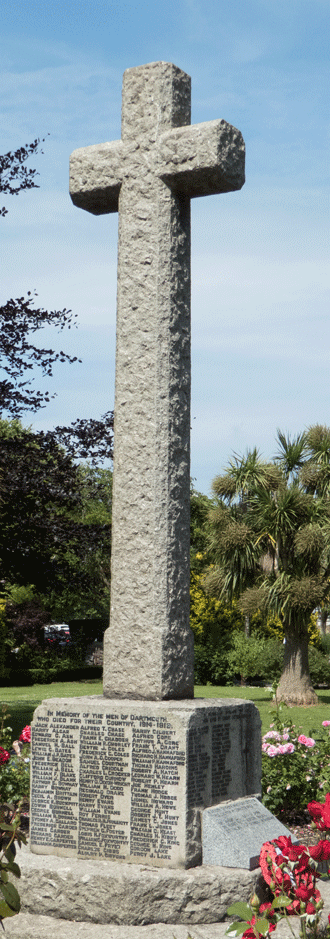Andrew Prettyjohn
Family
Andrew Prettyjohn was born in Dartmouth in 1896 (the precise date is not known) and baptised at St Petrox on 13th May 1896. He was the fourth surviving son of Harry Prettyjohn and his wife Bessie Scoble, both of whom had been born and brought up in Dartmouth.
(The name "Prettyjohn" was sometimes recorded with, and sometimes without, an "s", in various records. We have standardised on the name without the "s").
Harry Prettyjohn's parents, William Prettyjohn and Mary Pridham, were both born in Stokenham, but came to Dartmouth when they married in St Saviour's in 1851. William was a mariner. According to Census records, Henry, generally known as "Harry", was the second of their six children, the last of whom, Mary Jane, would appear to have been born some three months after her father's early death, aged 37, in 1864. He was buried at St Petrox.
By the time of the 1871 Census, the family were living in Lower Street, and Mary was working as a washerwoman. That year, Harry was apprenticed aged 14 in the merchant navy for a term of five years and eleven months, bound to Edward Vittery, of Brixham, a shipowner.
On 25th January 1882, at St Petrox, Harry married Bessie Scoble, whom he had presumably met in Dartmouth. Bessie, born Agnes Elizabeth Mardon Scoble, was the fourth child of John Scoble, a hairdresser, and his wife Florence Mardon. John was born in Dartmouth and Florence came from Torquay. The 1861 Census recorded the family living in Foss Street and at least six of their children, including Bessie, were baptised in St Saviour's. The youngest, George was born in Dartmouth (according to Census records) aroud 1875. At some point after this Florence moved back to Torquay with her two youngest children. Three of the older girls, Florence, Emma, and Bessie, remained in Dartmouth (one in Kingswear), where the 1881 Census records that they were employed in three different places as domestic servants. Bessie worked for James Fabian, a "Licensed Victualler", and his family, in New Road.
Baptism and census records show Harry and Bessie and their expanding family at many different addresses in Dartmouth. Harry turned his hand to whatever work came up. Sometimes his occupation was that of "mariner", "seaman", "fisherman" or "sailor", reflecting his apprenticeship; sometimes he worked as a coal lumper; sometimes as a general labourer. In their 1911 Census return, Harry and Bessie recorded that they had had twelve children, seven of whom were still living and five of whom had died. We have identified eleven:
- Harry junior, born and baptised in 1883
- William, born and baptised in 1884, and who died very soon after he was born
- William George, born in 1886
- Frank, born in 1890 and baptised in 1892 (named perhaps for Bessie's younger brother, who had died when he was two)
- Bessie Maud, born and baptised in 1892
- Sidney, born and baptised in 1894. He died in 1910, aged sixteen.
- Andrew, born and baptised in 1896
- Alfred Ernest (sometimes Ernest Alfred) born in 1898 and baptised in 1899, who died in 1901, aged three
- Winifred May, born in 1899 and baptised in 1903
- Emma Nora, born in 1902 and baptised in 1903, who died in 1904, aged two
- Charles Edwin, born in 1905, and baptised in 1913
Bessie did not live to see the loss of yet another of her children as she herself died in 1912.
Andrew was recorded age five in the 1901 Census, when the family was living in Coles Court. Accommodation in Coles Court was amongst the worst in Dartmouth, with families crowded together in old buildings, without proper sanitation. The buildings no longer exist, having been demolished in 1905 to make way for new offices for the Dartmouth coaling companies, and the present road connecting Lower Street to the Embankment. The family then moved to Oxford Slip, where they were recorded in the 1911 Census. William George had married and so left home, but six were still at home, several contributing to the family income as adults. Harry junior and Frank worked alongside their father as "coal porters". Bessie Maud was a housemaid, and Andrew, aged 15, worked as a Grocer's Errand Boy. Winifred and Charles were still at school.
As he grew older, Andrew may well have joined his father and elder brothers in the coal lumping trade. Dartmouth became a coal bunkering station for ships in the 1870s and the trade had grown rapidly. Although the work was labour intensive, the trade worked on the basis of casual employment. Because there were always three or four companies competing to coal any ship, the coal porters or "lumpers" would wait "on the stones" hoping to be included in a gang employed to shift the coal. Coaling companies owned one or more standing hulks moored on the river. When a ship came into harbour to coal, the lumpers would race to the coaling hulk in 6 or 8-oared gigs, kept moored against the quay wall. The winning gang would then load the coal from the hulk into baskets and leift these over the side into the bunkers of the vessel needing the coal. Proximity to the work was one reason why "coal lumping" families clustered in the roads nearest the quay. Poverty was another.
From 1901 onwards, both the tonnage of ships coming into Dartmouth for coal, and the amount of coal shipped for bunkering, began to decline - ships became larger than the port could handle; more coaling stations were set up elsewhere; more efficient engines meant that ships needed less coal; and gradually coal itself was replaced by oil and diesel fuel. These changes led to sales, mergers and takeovers amongst the coaling companies, so that by 1912 there was in effect only one company, Evans & Reid, with a monopoly on the business. Wages had remained the same for twenty years; and, given the nature of the business, lumpers could not rely on being able to work every day.
Lumpers felt a growing sense of grievance about their pay and working conditions and early in 1914, after a visit from Ernest Bevin, they decided to form a branch of the Dock and General Workers Union. They then put their demand to the coaling companies for a wage rise from 2d to 3d per ton. This was rejected outright so the lumpers went on strike. Evans & Reid advised customers to use their alternative facility at Portland, and the lumpers then called on men at Portland to "black" diverted ships in sympathy, which they did. Stalemate ensued. Eventually the men were forced back to work by poverty and hunger, without their claim being met. The Great War then intervened.
Service
Against this background, the excitement of the recruiting campaign in the first few weeks of the war must have come as a welcome diversion. According to the Darmtouth Chronicle of September 4th 1914:
An immense crowd assembled in the Royal Avenue Gardens last evening, when a public meeting, addressed from the bandstand, was held for the purpose of obtaining recruits for Lord Kitchener's Army. At a quarter to eight o'clock a procession was formed outside the Guildhall, and comprised the Mayor ... and the Corporation, who attended in State, a number of prominent townsmen, the Corporation Fire Brigade, and the Borough Band, which played martial airs. The flags of the Allies were born aloft in the procession.
Over forty recruits stepped into the bandstand, each to great applause. Andrew Prettyjohn was amongst them. His name appears in a list of those who had enlisted (or who were already serving), published in the Dartmouth Chronicle on 18th September 1914.
Together with many of those who stepped forward on that day, Andrew enlisted in the 8th Battalion of the Devonshire Regiment. Ordered to be formed on 7th August 1914, the 8th Battalion was the first of the so-called Kitchener or Service Battalions to be formed by the Regiment. It filled up very quickly with recruits. By 8th September the Battalion had moved to Rushmoor Camp in Aldershot, where the first problem they met was a severe shortage of everything they needed - accommodation, clothing, military equipment, and officers.
By November, when there were still shortages in headgear, the 8th moved to permanent barrack blocks in Aldershot, and the following month, because of pressure on the accommodation, into billets in Farnham. Gradually, over the next few months, the necessaries arrived and training proceeded, interrupted by sports and tug-of-war, from time to time watched by the Queen, who sent a special message to the Battalion to say how much she had enjoyed it.
On 25th May 1915, the Dartmouth Chronicle reported briefly on their progress:
Dartmouth Lads Ready for the Front
We have received from a correspondent a list of names of Dartmouth young men who on 4th September last, responded to the call of the ex-Mayor (Alderman C Peek) for recruits. They enlisted in the 8th Devon Regt (Buller's Own) and expect to shortly join the Expeditionary Force. In a short note our correspondent writes:
"We are all well and hope to see you all again. We hope to keep up the reputation of the good old Bulldog breed".
On behalf of our readers we cordially with them all good luck and a safe return.
The list of names is as follows:
- T Veale, machine gunner
- S Pyne, ditto
- F Widdicombe, signaller
- Private A Pepperell
- Private J H Smith
- Private H Evans
- Private A Prettyjohns
- Private J Bowers
- Driver J Goss
- Driver E Chase
- Private W Bennett
- Private W Carpenter
- Private F King
- Drummer F Pound
- Private W Evans
- Private A Lee
- Private A Light
- Private E Chase (junior)
- Private J Dennis (Cyclists)
- Private S Fryer
- Private J Webber
- Private F Peters
- Private F Fabian
It was not until July, however, that the 8th Battalion arrived in France. They left Aldershot on 25th July for the train to Southampton, reached Wizernes on 28th, and went into billets. According to the War Diary, there they were inspected by the Brigadier commanding GHQ troops "with many compliments on the battalion's smartness and soldierly bearing", and on 3rd August they marched to Molinghem, their overnight stop. The next day (which was the anniversary of the outbreak of war) they were in Carvin and joined the 20th Brigade of the 7th Division. They remained in Carvin until 16th August.
Here there was an opportunity for more correspondence and it seems that Gunner T Veale took the opportunity to write to Alderman Peek to let him know how his recruits were doing, leaving out the names of places just in case. The Dartmouth Chronicle reported on August 20th that:
Gunner T Veale writes that the Dartmouth lads in his battalion are all well, and speaks of the good progress all have made in the matter of efficiency.
"We had" he continues "a very nice trip across, although it was raining, but the weather had no effect on the men. We didn't land until next morning. I met two Dartmothians at the General Hospital. Next day we travelled by train for about eighteeen hours, right across country. It was lovely scenery as we rode along. It is hilly all through the railway. Everybody quite enjoyed the journey. We stopped at W----- for about seven days, had plenty of bathing, and on leaving there we marched about fifteen miles. It was hot work ... We stopped the night at ---- and went on again next day to where I am now. We have had one day's rain since we have been here. We shall get used to the heat in time. There is a canal alongside where we are now. We have plenty of time for bathing and football, which, of course, you know I liked at home. We have not been in the trenches yet, but we are waiting our turn, which won't be very long. We can hear guns and see the searchlights every night. Our troops have had a big gain, but it was the long thunder of the guns that won the battle. It is pretty quiet along the front today".
This rather holiday-like atmosphere seems to have persisted even as the Battalion reached the front line and went into the trenches. The following account of Andrew's war is drawn from the Battalion War Diary.
16th August. "A company was attached to 21st Brigade for a 48 hour tour of instruction, to be followed by each company in turn." (This may be what Veale meant by "we have not been in the trenches yet, but we are waiting our turn").
17th August. "The rest of the battalion left Carvin for Locon. B company then went into the trenches for its tour of instruction and suffered the Battalion's first casualty on 19th August 1915 - Pte Pearcey; another man, Private Oak, was wounded."
21st August. "The CO, MO and self (ie the author of the war diary), went to the trenches for a tour of inspection and returned the same night. Things seem very quiet. Sandbags innumerable". C Company must have gone up also but the War Diary doesn't say when.
22nd August. "Draft of 50 men arrived from 11th Battalion. D company went up to the line for its instructional tour in the evening and returned on 24th August, no casualties. However there was one casualty on a working party which was out all night."
26th August. "The Battalion took over C1 sector of trenches in relief of 2nd Bedfords. These trenches were made by 1st Battalion last October which is curious".
27th August. "A very quiet day."
28th August. "3 am, snipers busy; 3pm, very hot, no activity; 11pm, shelled enemy working party - success unknown."
29th August. "Noon, very very quiet and still; 3 pm, shelled this afternoon, otherwise quiet."
30th August. "Not much doing". Relieved by 9th W Fusiliers. To billets at Les Choquaux.
31st August. "Marched to billets near Busnes."
1st September. "Rested."
The Battalion then moved to a section of the line south of the La Bassée canal, and east of Vermelles. The War Diary continues:
2nd September. Marched some 15 miles to Noyelle arriving at about 10.30 pm and 'had to fit into inferior billets where one best could".
3rd September. Noyelle: "Very wet". Working parties went out in the evening.
4th September. Noyelle: "Got orders at noon to go into sector V2A of the trenches ... Trenches fearfully wet and muddly condition; not so comfortable as the last sector and little room ...A lot of digging required"
5th September: Sector V2A: "Went round the line in morning. Very sticky and muddy. Very quiet. Fine".
6th September. Sector V2A: "Warm. Quiet on the whole. Machine Gun emplacement spotted by 2nd Lt Pepys and shelled by Howitzer who claim direct hit. The Patrols last night reported large covering party of enemy in front of some wire we want to reconnoitre"
7th September. Sector V2A: "Patrols went out last night and by their information machine gun fire was brought to bear on enemy. A quiet day and warm. These trenches have improved a lot since we have been here ..."
8th September. Sector V2A: "Easterly wind and warm. Some rumour of German attack. Relieved by 2nd Warwicks 3-5pm. Returned to billets at Verquigneul, got there at 7pm."
Death
The author of the War Diary then continues:
Had one man killed and one wounded during last 24 hours which was bad luck. All three men killed [so far] have had names beginning with P - Privates Pearcey, Pinch and Prettyjohn.
Andrew's war had lasted a little over three weeks. He was a little over nineteen.
On 24th September, the Dartmouth Chronicle printed a letter sent to the Prettyjohn family by Private F Underhay, also of the 8th Devons, bringing the news of Andrew's death, under the headline "A Hero's Death":
Just a few lines to let you know of what I daresay you have already heard - the death of your son. You can rest assured he died a hero's death, doing his duty for his country.
His death was instantaneous. He was shot through the head, the bullet entering an inch from the right eye and coming out through the left, so you see the poor old boy did not suffer; it was a bullet from a German sniper when he was with a working party..... he was buried as a soldier in a soldier's grave, in a cemetery of our own, and decently.
I am sorry I cannot break the news any differently, but I thought it would ease your mind to know how he died and that he was buried decently."
The newspaper continued:
Private J H Smith, 8th Devon Regiment, writing to his wife, who lives in Foss Street, refers to the death of Pte Prettyjohns, who, he says, was on guard when he was killed. He was buried within three hours of his death. He had been in the regiment 12 months and 5 days.
Commemoration
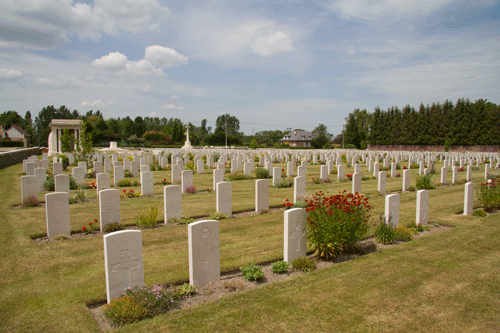
Andrew is buried in Vermelles Cemetery, close to the sector of the line where he was killed. His grave is in Plot 1, the part of the Cemetery completed first after the cemetery was begun in August 1915.
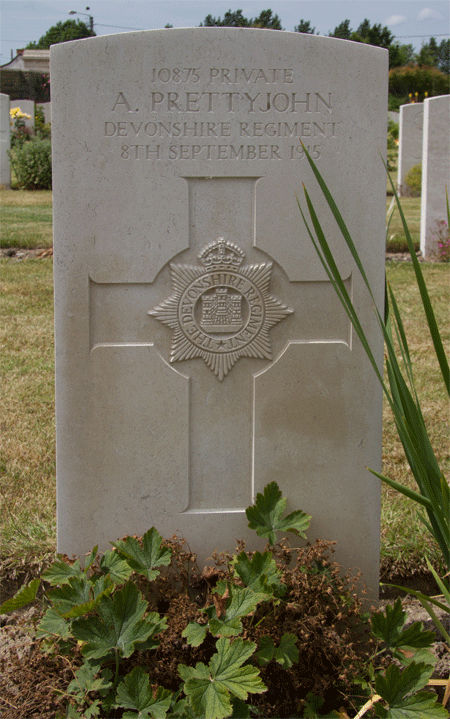
As one of the 579,206 casualties in the region of Nord-Pas-de-Calais, Andrew is also commemorated on the new memorial at Notre Dame de Lorette, "The Ring of Memory".

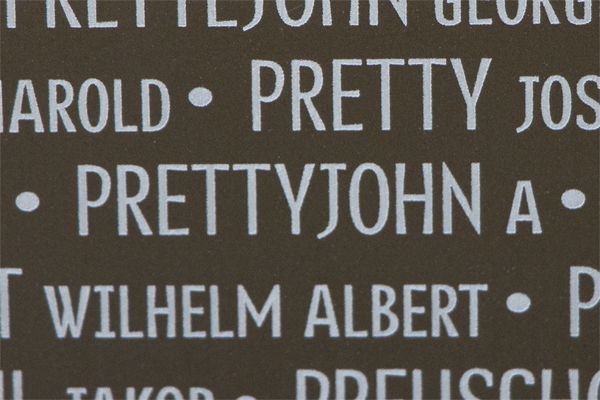
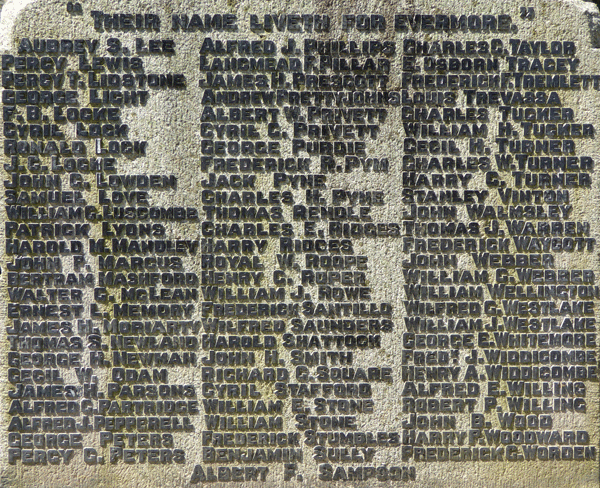
Andrew is commemorated in Dartmouth on the Town War Memorial and the St Saviour's Memorial Board.
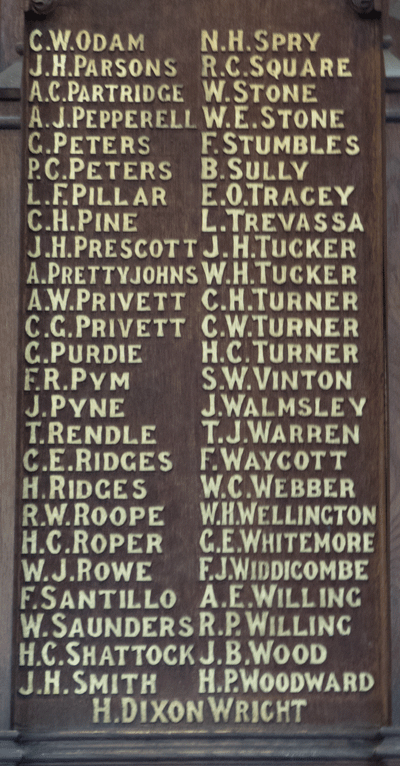
Sources
The Bloody Eleventh: History of the Devonshire Regiment, Volume III: 1914-1969, by W J P Aggett, publ by The Devonshire and Dorset Regiment, 1995
The Devonshire Regiment 1914-1918, by C T Atkinson, publ Eland Bros Exeter, 1926
The War Diary of the 8th Battalion Devonshire Regiment is available for download from The National Archives (fee payable), reference WO 95/1655/2.
Information Held on Database
| Surname: | Prettyjohn |
| Forenames: | Andrew |
| Rank: | Private |
| Service Number: | 10875 |
| Military Unit: | 8th Bn Devonshire Regiment |
| Date of Death: | 08 Sep 1915 |
| Age at Death: | 19 |
| Cause of Death: | Killed in action |
| Action Resulting in Death: | Shot by sniper |
| Place of Death: | Near Vermelles |
| Place of Burial: | Vermelles Cemetery, France |
| Born or Lived in Dartmouth? | Yes |
| On Dartmouth War Memorial? | Yes |
| On St Saviour's Memorials? | Yes |
| On St Petrox Memorials? | No |
| On Flavel Church Memorials? | No |
| In Longcross Cemetery? | No |
| In St Clement's Churchyard? | No |
| On a Private Memorial? | No |
| On Another Memorial? | No |















